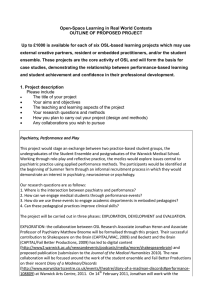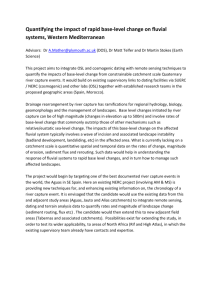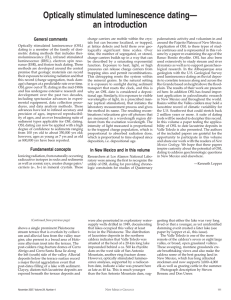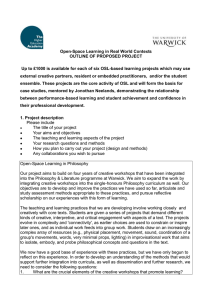Open-Space Learning in Real World Contexts OUTLINE OF PROPOSED PROJECT
advertisement
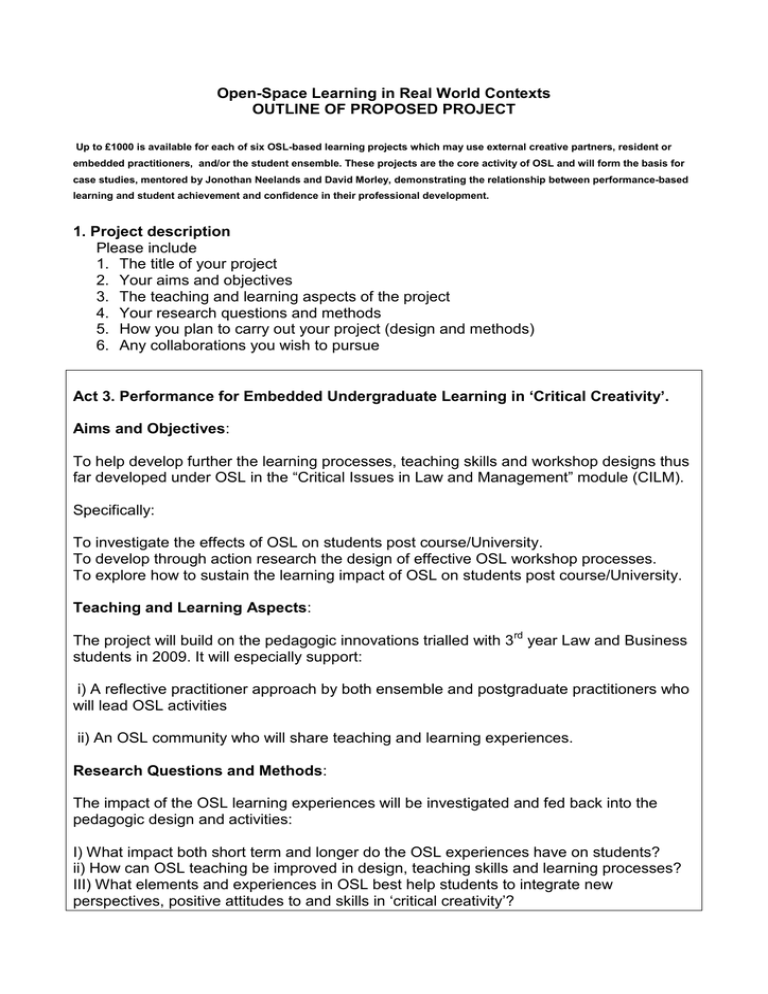
Open-Space Learning in Real World Contexts OUTLINE OF PROPOSED PROJECT Up to £1000 is available for each of six OSL-based learning projects which may use external creative partners, resident or embedded practitioners, and/or the student ensemble. These projects are the core activity of OSL and will form the basis for case studies, mentored by Jonothan Neelands and David Morley, demonstrating the relationship between performance-based learning and student achievement and confidence in their professional development. 1. Project description Please include 1. The title of your project 2. Your aims and objectives 3. The teaching and learning aspects of the project 4. Your research questions and methods 5. How you plan to carry out your project (design and methods) 6. Any collaborations you wish to pursue Act 3. Performance for Embedded Undergraduate Learning in ‘Critical Creativity’. Aims and Objectives: To help develop further the learning processes, teaching skills and workshop designs thus far developed under OSL in the “Critical Issues in Law and Management” module (CILM). Specifically: To investigate the effects of OSL on students post course/University. To develop through action research the design of effective OSL workshop processes. To explore how to sustain the learning impact of OSL on students post course/University. Teaching and Learning Aspects: The project will build on the pedagogic innovations trialled with 3rd year Law and Business students in 2009. It will especially support: i) A reflective practitioner approach by both ensemble and postgraduate practitioners who will lead OSL activities ii) An OSL community who will share teaching and learning experiences. Research Questions and Methods: The impact of the OSL learning experiences will be investigated and fed back into the pedagogic design and activities: I) What impact both short term and longer do the OSL experiences have on students? ii) How can OSL teaching be improved in design, teaching skills and learning processes? III) What elements and experiences in OSL best help students to integrate new perspectives, positive attitudes to and skills in ‘critical creativity’? Longtitudinal research will follow 3 cohorts of 2009, 2010 and 2011 undergraduates (c 140) in either continuing academic or professional studies or in employment. Design and Methods: In the core module ‘Critical Issues in Law and Management’ case presentation workshops and ‘text’ based seminars will be facilitated by students in the Business School and Graduate practitioners from CAPITAL, Theatre Studies, and/or Education. These sessions will be practical and experiential. Film evidence, digital social networking through blogs etc and student involvement in design and content decisions will increase the reflective and enactive practitioner processes of both the performance coaches, the PG faciltutors and the student performers. Working with the e-learning / technology NTF the project will explore possibilities for blended OSL, especially in the areas of creative reflection, performance itself and the functioning of a creative performance social learning network. Collaboration: Interdisciplinary and across institutions: Participation of students with other performance initiatives at Warwick will be facilitated and non module opportunities established to perform and learn further. Links will be set up with creative student learning in other HEIs, e.g. Birmingham Conservatoire. Collaboration with the KCL/Warwick Graduate Pledge projects networks. Collaboration with the “Kolbs at Weatherhead’s” Experiential Centre of Excellence . 2. Which aspect of Open-space Learning does the project address? (Please include all that apply and give details of how they will be addressed) 1. Exploring innovative teaching and learning in and for the higher education community in England 2. Applying workshop practice and collaborative learning in flexible teaching spaces 3. Employing enactive and experiential learning, applied drama, role play and ethnodrama 4. Identifying workable assessment methodologies for these styles of learning 5. Testing the efficacy of OSL and measuring its impact : see box. Helping to design learning which supports ‘critical creativity’ in the fields of Business and Law by introducing embodied and experiential methods. Using students and early career practitioners to support and coach other students’ development in creativity and presentation in open-space contexts. Asking students to ‘perform’ their learning individually and in small groups through dramatised case studies, and role-plays of potential working scenarios Investigating reflective case work as a qualitative method Using 4, plus tracking 12 month post OSL impacts and sustained learning. How does your project link with the aims and objectives of the OSL project? Develops sustained critical creativity in Undergraduates: OSL has proved an important means of enriching students’ learning in Law and Business and so addresses OSL’s commitment to interdisciplinarity. OSL’s focus on “real world” contexts is highly relevant here, also, as students develop skills that address their needs beyond university. Finally, all the methods detailed above provide an experiential method of learning that engages students both physically and intellectually with the subject matter. Helps build OSL knowledge through experience of and reflection on OSL in this module. Helps develop a OSL cadre of Postgraduate coaches and tutors. 3. Timescale Preferred start date: ……June 2010… Estimated completion date: …July 2011… What is your proposed schedule of work for this project? Please indicate the numbers of students involved and key dates. Stage 1. Establish the database of cohorts 2009 and 2010, both students (100) and Postgraduates (8). Carry out baseline research with the cohorts. 2 undergraduate students from the disciplines involved will conduct this exercise under the supervision of a postgraduate student from Theatre Studies or Drama education. Stage 2 Rachel King to run 1 workshop on “Presence” for students taking CILM (60 individuals). Recruit 4-6 student “facilitutors” to co-facilitate 4 sessions over the two terms. RK to provide OSL training session linked to the “Presence” session. Select and develop material for OSL 2010/11 module Stage 3 Run supportive OSL workshops (50 + 6) Set up and operate e networks to all stakeholders in the programme. (Blog, podcasts, webinars). Run 2 reflective review workshops with Students and postgraduates.* Ongoing research of participants Stage 4 Complete research of 2009, 2010 cohorts Preliminary projective research on cohort of 2011. Write up project 4. Impact What are the expected outputs and outcomes of your project? What are your success criteria? A cadre of OSL practitioners at undergraduate level. A confident student cohort, experienced in critical creativity, comfortable and committed to the sustained use of the creative and critical skills, perspectives and values developed during the OSL project. A bank of workshop activities, processes, and experiential material from the OSL workshops and other activities for use in the future. Improved working knowledge of OSL amongst participants and practitioners. Success will be judged by comparative module results, student feedback,and longitudinal studies. 5. Dissemination and evaluation How do you see the outputs disseminated within the University of Warwick and outside? The potential for: Student-led workshops Pedagogic seminars Conferences e.g.LILAC Collaboration with other OSL and creative learning institutions Publications How will you evaluate the success of your project? The confidence , competence and performance levels of the Undergraduates mid-term (i.e. 6 - 12 months later). Module results. Results of longitudinal studies. Student feedback. The confidence , competence and performance levels of the Postgraduates at the end of the module. 6. Resources What are the resources you need to carry out your project? e.g Travel, video/audio recording, fees, specialist equipment, clerical support… 1) 2) 3) 4) Payment of ensemble and practitioners for OSL workshops and follow up £500 Materials for OSL workshops – DVDs, CDs, books. £100 Travel, recording/editing and transcription of performances and research £300 Preparation and staging of several diffusion events. £100 Name (please print): …GRIER PALMER, Warwick Business School Date:……31.01.2010……………………………………………………………………………….
